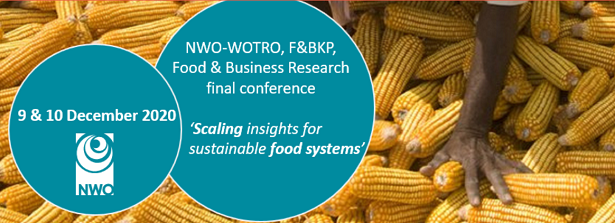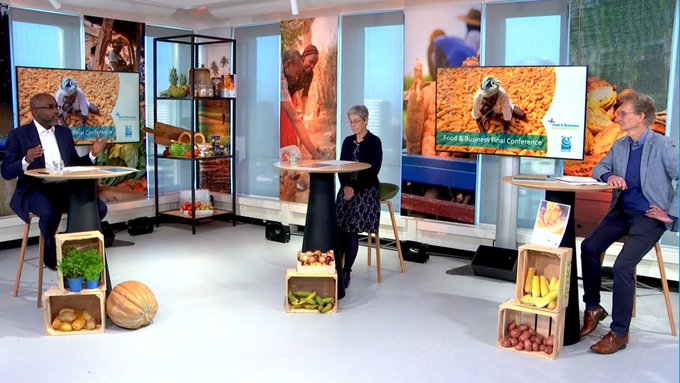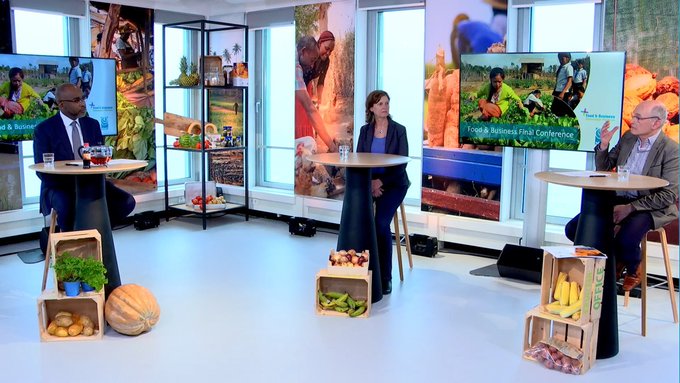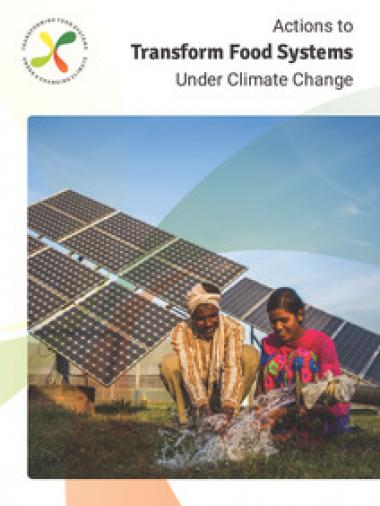The NWO-WOTRO Food & Business Research Programme (F&B) aims at addressing persistent food security challenges in low and middle income countries. It focuses on the urgent and growing need for adequate knowledge and solutions for regional and local problems related to food security.
The final conference invited all 75 consortia from the GCP (Global Challenges Programme) and ARF (Applied Research Fund) to showcase and discuss their results. A synthesis study of the research projects under the Food & Business Research programme is executed by Danielle de Winter and Ellen Lammers. The following papers are the result of this synthesis study. The full papers, as well as the executive summaries, can be downloaded from these links. The synthesis study resulted in:
- Thematic papers, focusing on the main insights per research theme
- Opportunities and barriers of circular agriculture | Full thematic paper | Food & Business Research PDF | 5.9 MB
- African indigenous foods | Full thematic paper | Food & Business Research PDF | 4.08 MB
- Inclusive business | Full thematic paper | Food & Business Research PDF | 2.61 MB
- Smallholder production | Full thematic paper | Food & Business Research PDF | 3.29 MB
- Private sector | Full outcome paper | Food & Business Research PDF | 1.8 MB
- Small-scale farmers | Full outcome paper | Food & Business Research PDF | 3.83 MB
- Policymakers and practitioners | Full outcome paper | Food & Business Research PDF | 3.39 MB
- Outcome papers, focusing on the changes achieved with different types of stakeholders
All research funded through Food & Business Research has been conducted in co-creation with other partners active in the field of food and nutrition security. This is based on the assumption that such partnerships coupled with Research Uptake strategies would enhance the potential for scaling of insights, findings and innovation.
Keynote: Melissa Leach - Food System Transformation: How and why politics matter
- Addressing blind spots to scale for impact
This session built on the synthesis study on Scaling, which focuses on the blind spots in scaling literature and practice, and in what way and to what extent research projects about scaling have addressed these blind spots. - Fish for Feed or Fish for Food: What role for the Netherlands in preventing or facilitating sustainable aquaculture feeding practices?
This panel builds on six research projects* funded by the NWO Global Challenges Programme that have worked on the nexus between fisheries and aquaculture in various Asian and African contexts. - Syspons Food & Business Research external evaluation
The final reports of the evaluation of ARF and GCP was presented.
- Climate-smart solutions for improving yields: Findings from ARF-funded trials of fertilizer systems.
In this interactive session information will be shared on the uptake, impact, and sustainability of the fertilizer systems introduced under ARF research projects. - Sustainability and organisation in dairy markets in East Africa
This session shared the results of empirical research on sustainable dairy development in East Africa and discuss the implications for practice, policy and research. - The role of risk and finance in upscaling climate smart agriculture practices among smallholder farmers
This session provided evidence on the role of risk and financial constraints in the promotion of and upscaling climate smart agriculture (CSA) practices among smallholders in developing countries
Promoting climate resilient maize varieties in Uganda Duration: January 1, 2018 – December 31, 2020
Climate-Smart Financial Diaries for Scaling in Kenya Duration: October 1, 2017 – October 1, 2020
Upscaling climate smart agriculture via micro finance in Tanzania (CSA/SuPER) Duration: October 1, 2017 – March 31, 2020 - Research for impact: experiences with hitting the ground running in ongoing transition processes.
- Diversification of the fork using local foods: Lessons learned on the impacts and pathways from various contexts
Nutrition sensitive farm-to-fork interventions based on ‘local foods’ are a promising way to sustain the food and nutrition security of vulnerable communities in both rural and urban settings. - Re-building ‘Agribusiness Ethics’ for a sustainable food system
This session focuses on Agribusiness Ethics and Quality Management and is based on the results of ARF projects in Uganda and Kenya - Scaling Climate Smart Agriculture in Eastern and Southern Africa for Resilient Food Systems
CSA is an approach for developing sustainable agricultural strategies to guide actions needed to reorient and transform agricultural systems to secure food security under changing climate. By learning from past and on-going GCP initiatives, the session will discuss: (i) barriers to scaling, (ii) drivers and opportunities for inclusive CSA scaling in crop and livestock value chains, and (iii) new innovations, business models, incentives and financing mechanisms for to stimulate broad-based uptake of CSA to transform agriculture in ESA.
Resource:
CCAFS (2020) ACTIONS TO TRANSFORM FOOD SYSTEMS UNDER CLIMATE CHANGEby CGIAR Research Program on Climate Change, Agriculture and Food Security. 70 pages - Sustainability transitions of food systems: a political affair
The organisers of this session will discuss together with the participants how politics and power in food systems can be understood and managed better by practitioners and policy makers to support the transition to more sustainable food systems.Speakers
- François Uwumukiza, Embassy of the Kingdom of the Netherlands in Kigali
- Frank Mechielsen, Hivos
- Vivek Vivekandan, South Indian Federation of Fishermen Societies (SIFFS)
- Caro Krijger, Dutch Ministry of Foreign Affairs
ECDPM’s Paulina Bizzotto Molina will be facilitating the session together with Nina de Roo.
- Research for Impact approach: testing assumptions
Theories of Change and Impact Pathways are used as guiding frameworks, transdisciplinary consortia work in co-creation, and Research Uptake efforts are integrated in research activities.







No comments:
Post a Comment